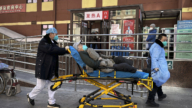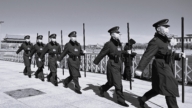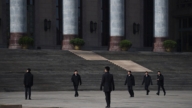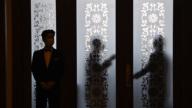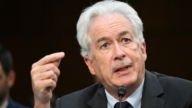【新唐人2013年09月21日訊】「9.18事變」82週年之際,中、日在釣魚島繼續尖銳對立,隨時有擦槍走火之勢;但在中國大陸的「9.18」週年紀念日卻異常平靜,平靜得讓日本人都感到意外。為甚麼國內、國外的局勢會表現出兩重天呢?請看報導。
9月10號是日本對釣魚島實施「國有化」整整一年的日子。當天,中共派出7艘海警船駛入釣魚島8海浬的領海內巡查,日本海上保安廳則派出7艘執法船展開監視和阻攔,中、日展開「一對一」巡海護權行動﹔中方4艘海警船11號再次進入釣魚島海域巡查,與日方4艘海保船又短兵相接。
據大陸媒體消息指稱,中共海警船1年來巡航釣魚島59次,最近距島0.28海浬,多次與日船近距離對峙。
北京時政觀察人士華頗:「前兩天日本媒體報導,發現中國的無人機進入釣魚島上空,並威脅要擊落它。中國(共)外交部發言人也對此回應說我們有決心、有能力維護釣魚島的主權。這時,美軍太平洋司令也發表了一個講話,說有可能派『魚鷹』運輸機進入釣魚島。」
北京時政觀察人士華頗認為,中日關係正在向不可預知的方向發展,如果雙方行為不收斂,衝突不可避免。
華頗表示,最近中共審訊薄熙來,打擊、整肅網路都引發民眾對中共的不滿,所以需要轉移人們的視線,需要用民族主義精神來重新凝聚人心。釣魚島危機就能達到這一目地。
不過,在「9.18事變」82週年的紀念日,除了當年的事發地—-遼寧瀋陽在上午9點18分,全市鳴響防空警報三分鐘外,只有吉林長春、河南鄭州等地鳴響防空警報。在中國網絡上,也沒有任何關於「呼籲進行遊行」的消息。
日本的《每日新聞》報導說:在迎來「9.18事變」82週年的18號,大陸地方媒體雖然發表了相關評論,但是包括北京的日本駐中國大使館在內的日本駐在單位、企業等,都沒有遇到顯著的抗議活動。
日本第11管區海上保安總部18號也透露,中共公務船從4號起已連續14天進入毗連區,但兩艘中國海警船已於17號晚間10點50分左右先後駛離該水域。
「9.18事變」是指1931年9月18號,日本軍隊以中國軍隊炸毀日本修築的南滿鐵路為藉口而佔領瀋陽。事變爆發後,日本與中國之間矛盾激化,日本開始全面侵華。短短几年時間內,東北三省全部被日本關東軍佔領。
9月18號被中國人視為國恥日。
在去年,瀋陽、北京、上海、廣州、西安等150個城市發生了反日遊行,多地發生了「打砸搶」事件,無數日系汽車被砸。
今年的9.18中國卻如此的平靜,連日本媒體都感到意外。《法國國際廣播電臺》引述日本媒體的消息說:「中國好像忘了反日騷動」。
時政評論家伍凡認為,目前國內外的政治經濟形勢,逼迫習近平緩和與日本的關係。
美國中文媒體《中國事務》總編輯伍凡:「從這個舉動來看,他不想跟日本關係搞得更殭,搞得更壞,現在已經有一個釣魚島了;第二個原因,中國和日本經濟貿易交往,已經大幅度下滑,已經快沒有生意做了;第三點,日本從中國的資本都撤出來,撤到東南亞去了。」
日本《中文導報》近日報導,2013年上半年中日兩國貿易規模為1472億美元,同比減少了10.8%。
伍凡還指出,中國國內局勢非常敏感,各地維權抗暴此起彼伏,中共都不敢利用「大規模群眾運動」,來達到政治目地伎倆了。
伍凡:「現在東北三省維權抗暴很厲害,他們絕對不會看好中共。如果再加上一個大家上街抗議日本人,是不是這種維穩抗議會轉向,轉向抗議中共,所以它也害怕。」
《法廣》也指出,中共當局今年格外小心,為了達到維穩的目地,採取了禁止、阻礙民間任何反日集會活動的措施。
採訪/朱智善 編輯/宋風 後製/李智遠
China Japan Standoff Over Diaoyu Islands.
9.18 Anniversary Protests Absent
On the 82nd anniversary of 9.18 Incident, China and
Japan are in a stand off over the Diaoyu Islands.
The 9.18 incident refers to an event that
initiated Japans invasion of Manchuria in 1931.
A military confrontation over Diaoyu
could happen at any moment.
However, mainland China is unusually quiet
on 9.18, which even surprised the Japanese.
Why is the situation inside and outside of China so different?
September 10 marked a year since
Japan nationalized the Diaoyu Islands.
The CCP dispatched seven coast guard boats into territorial
waters, within 8 nauitcal miles of the Diaoyu Islands.
The Japanese coast guard dispatched 7 enforcement
vessels to monitor and block the Chinese boats.
China and Japan had faced a direct confrontation.
4 Chinese coast guard boats went into the territorial waters
of the Diaoyu Islands again on September 11, for inspection.
4 Japanese boats were again sent to stop them.
According to mainland Chinese media, the CCP
coast guard boats have gone to Diaoyu Island
territorial water 59 times in one year.
At one point, the boats were 0.28
nautical miles from the Diaoyu Islands.
Chinese and Japanese boats have
had close standoffs many times.
Hua Po, political expert, Beijing:"Japanese
media recently reported that a Chinese UAV
went into the Diaoyu Islands airspace.
Japan wanted to shoot it down.
The CCP’s foreign ministry spokesman responded
that China has the confidence and power to
safeguard the sovereignty of the Diaoyu Islands.
Meanwhile, a U.S. Pacific commander gave a speech.
It was stated that the US may send the
Osprey aircraft to the Diaoyu Islands."
Hua Po believes China-Japan relations are unpredictable.
If both sides are reluctant to back down, conflict is inevitable.
Hua Po indicates that Chinese people are unsatisfied with
the Bo Xilai trial and recent crackdowns on internet speech.
The CCP will be using the spirit of
nationalism to distract people’s attention.
The Diaoyu Islands dispute is a good topic to achieve this.
On 9.18 this year, only three locations rang air
raid sirens at 9:18 am to mark the anniversary.
This was in Shenyang, Liaoning Province, where
the incident happened, as well as Changchun,
Jilin Province, and Zhengzhou, Henan Province.
There were no calls for protest sent out over the internet.
Japanese media The Mainichi released a report.
On the 82nd anniversary of 9.18, although mainland local
media published commentaries, no Japanese institutions
or companies in Beijing suffered any protest activities.
Japanese No.11 District Coast Guard Headquarter
stated on September 18 that Chinese ships have
continually entered border waters since September 4.
The two Chinese coast guard boats left these
waters at around 10:50 pm on September 17.
9.18 incident happened on Sept 18, 1931.
The Japanese military seized Shenyang,
after a small explosion on the Nanman railway
was blamed on the Chinese dissidents.
After the incident, Japan and China conflict intensified,
and Japan began a full-scale invasion of China.
The Japanese military occupied 3
northeastern Provinces in a few years.
The Chinese people see 9.18 as a day of humiliation.
Last year, anti-Japanese protests took place in 150 cities
including Shenyang, Beijing, Shanghai, Guangzhou, Xian.
People smashed Japanese cars
and restaurants in many cities.
This year’s 9.18 was very peaceful,
leaving Japanese media surprised.
Radio France International quoted from Japanese media.
It said,"it seems like China forgot anti-Japanese activities."
Political commentator Wu Fan indicates that the current
domestic and international political and economic situation
has forced Xi Jinping to alleviate China-Japan relations.
Wu Fan, Chief Editor, China Affairs:"From
this action, he (Xi Jinping) doesn’t want
to intensify the relationship with Japan.
There’s already the Diaoyu Islands dispute.
Secondly, trading between China
and Japan has declined substantially.
There’s almost no business between the two.
Japan has withdrawn its capital from China
and moved the investment to Southeast Asia."
Japanese media Chubun recently reported that during the
first half year of 2013, trade between China and Japan
was $147.2 Billion, representing a decrease of 10.8%.
Wu Fan also suggests that China’s
domestic situation is very sensitive.
Rights activities are everywhere, and the CCP doesn’t
dare to use “mass movements" to achieve political goals.
Wu Fan:"Rights protection in three
northeastern provinces are very severe now.
People are definitely not very optimistic towards the CCP.
If people also protest against Japan on the streets, it’s
hard to tell if the protest may also turn against the CCP.
Thus, the CCP is afraid of that."
RFI also pointed out that the CCP is very careful this year.
It took measures to ban and stop civil anti-Japanese
activities, in order to maintain social stability.



